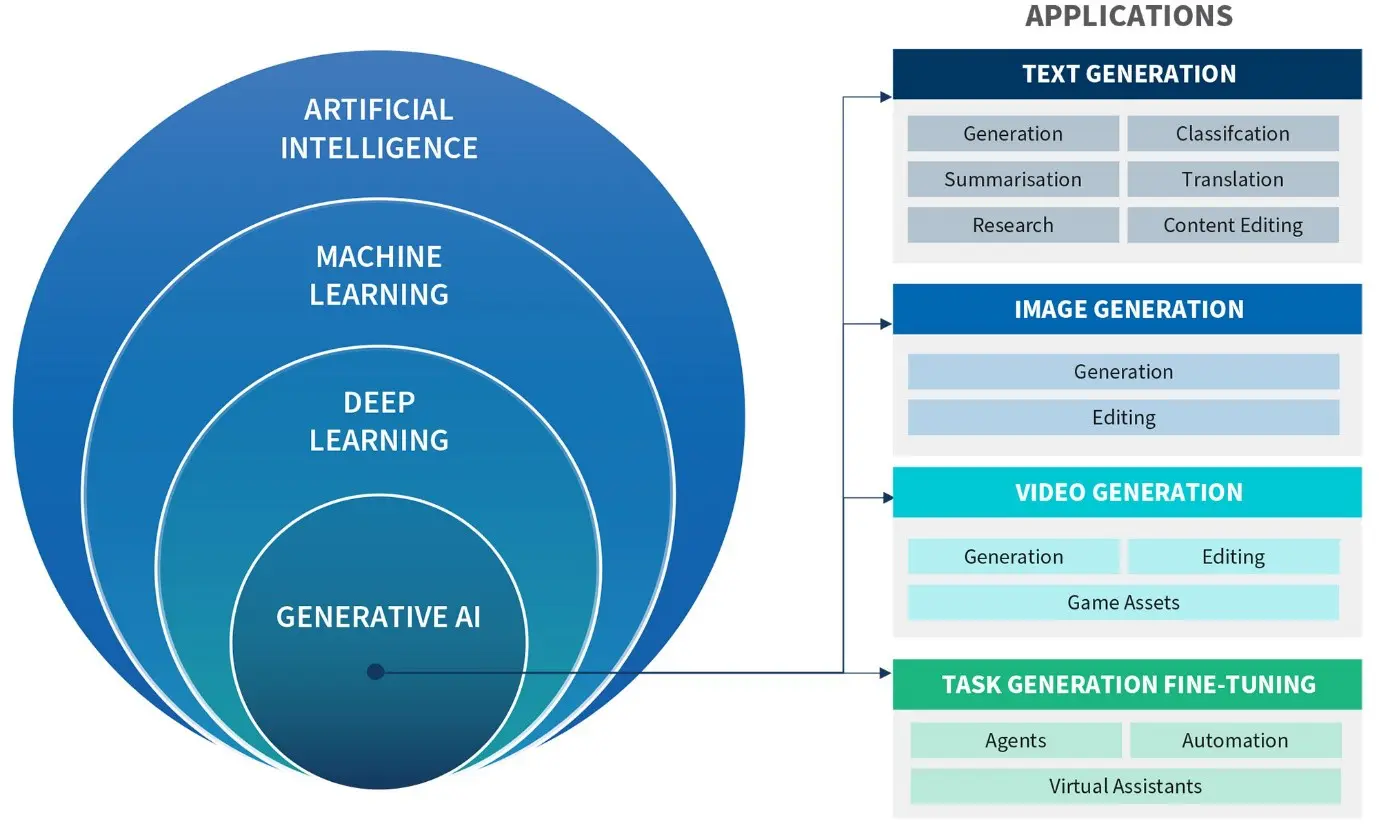In recent years, the field of education has witnessed a transformative shift with the integration of artificial intelligence (AI). Among the various advancements, generative AI stands out as a game-changer, offering the potential to revolutionize traditional educational models. From personalized learning experiences to creating new educational content, generative AI is poised to shape the future of education in profound ways. In this blog, we will explore the impact of generative AI in education, focusing on adaptive learning and beyond.

Understanding Generative AI
Generative AI refers to a subset of artificial intelligence that can generate new content, such as text, images, music, and more. This is achieved through models like Generative Adversarial Networks (GANs) and Transformer-based architectures (e.g., GPT-3 and GPT-4). These models learn from vast amounts of data and can produce creative outputs that are coherent and contextually relevant.
In the context of education, generative AI can create customized educational materials, simulate real-world scenarios, provide instant feedback, and much more. This capability opens up numerous possibilities for enhancing teaching and learning experiences.
Adaptive Learning: A Personalized Approach
Adaptive learning is an educational method that uses technology to tailor learning experiences to individual students’ needs, strengths, and weaknesses. Generative AI plays a crucial role in making adaptive learning more effective and accessible.
Personalized Content Creation
One of the primary benefits of generative AI in adaptive learning is the ability to create personalized content. Instead of a one-size-fits-all approach, generative AI can design customized lessons, exercises, and assessments based on each student’s learning pace and style. For example, if a student struggles with a particular math concept, the AI can generate additional practice problems and explanations targeted at that specific area of difficulty.
Real-Time Feedback and Assessment
Generative AI can provide real-time feedback on assignments and assessments, helping students understand their mistakes and learn from them immediately. This instant feedback loop is crucial for effective learning, as it allows students to correct errors and misconceptions while the material is still fresh in their minds.
Dynamic Learning Paths
Adaptive learning systems powered by generative AI can create dynamic learning paths that adjust as the student progresses. These paths can recommend new topics to explore, suggest supplementary materials, and even predict future learning challenges based on the student’s performance and interaction patterns. This ensures that each student receives a unique and continually evolving learning experience.
Beyond Adaptive Learning: Broader Applications of Generative AI in Education
While adaptive learning is a significant application of generative AI in education, the potential of this technology extends far beyond. Here are some other areas where generative AI can make a substantial impact:
Content Generation and Curriculum Development
Generative AI can assist educators in developing new curriculum materials. By analyzing existing educational resources and standards, AI can suggest content that aligns with curriculum goals and fills in gaps where current materials may be lacking. This not only saves time for educators but also ensures that students receive comprehensive and up-to-date information.
Interactive and Immersive Learning Experiences
Generative AI in education can create immersive learning experiences through simulations and virtual environments. For instance, AI-generated simulations can provide students with hands-on experience in subjects like biology, chemistry, and physics without the need for physical lab equipment. Virtual reality (VR) environments powered by generative AI can transport students to historical events or distant geographical locations, making learning more engaging and impactful.
Language Learning and Cultural Education
Language learning can be greatly enhanced with generative AI. AI-powered language tutors can generate conversational practice scenarios, provide instant corrections, and adapt to the learner’s proficiency level. Additionally, generative AI can create culturally rich content that helps students understand and appreciate different cultures, promoting a more global perspective.
Addressing Educational Inequality
Generative AI in education has the potential to bridge educational gaps by providing high-quality resources to underserved communities. With AI-generated content, students in remote or underfunded areas can access the same level of education as those in more privileged regions. This democratization of education can help reduce disparities and promote equitable learning opportunities for all.
Challenges and Ethical Considerations
While the potential of generative AI in education is immense, it is essential to address the challenges and ethical considerations associated with its use:
Data Privacy and Security
The use of AI in education involves collecting and analyzing vast amounts of student data. Ensuring the privacy and security of this data is paramount. Robust measures must be implemented to protect sensitive information and comply with data protection regulations.
Bias and Fairness
Generative AI models can inadvertently perpetuate biases present in their training data. It is crucial to develop strategies to identify and mitigate these biases to ensure that AI-generated content is fair and inclusive. Educators and AI developers must work together to create models that promote equity and diversity.
Teacher and Student Roles
The integration of AI in education should complement, not replace, the roles of teachers and students. Teachers should be empowered to leverage AI as a tool to enhance their teaching methods, while students should be encouraged to use AI to augment their learning experiences. Maintaining the human element in education is essential for fostering critical thinking, creativity, and emotional intelligence.

Generative AI holds tremendous promise for the future of education. By enabling personalized learning experiences, creating interactive and immersive content, and addressing educational inequalities, AI has the potential to transform how we teach and learn. However, realizing this potential requires careful consideration of ethical issues and collaboration between educators, AI developers, and policymakers. As we move forward, it is essential to harness the power of generative AI responsibly and inclusively, ensuring that all students benefit from the advancements in educational technology.








